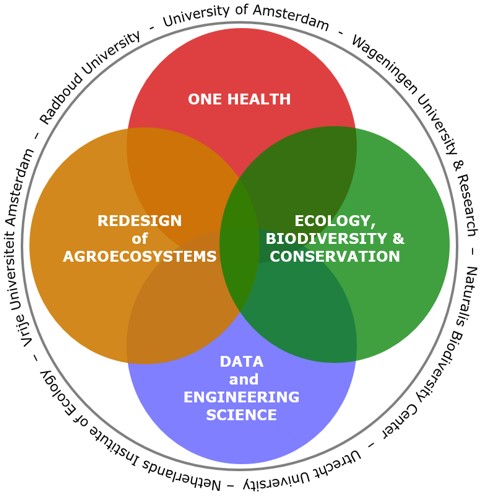Research Strategy
You are here
Within its mission, Understanding the functioning of natural and managed ecosystems, to improve the quality of life, research in PE&RC focuses on sustainable agro-production, biodiversity, ecosystem services, one health, the bio-based economy, land dynamics and multifunctional land use with bio- and geosciences as corner stones of PE&RC research. Ecosystems studied range from intensive agricultural production systems (e.g. greenhouses) to extensive semi-natural systems (e.g. agroforests and pastoral systems), to natural systems (e.g. wetlands, savannas, and protected areas).
PE&RC research challenges are to:
- Understand the complexity of ecosystems and derive unifying concepts at various spatial and temporal scales;
- Assess how these concepts vary between different spatial-temporal scales and different levels of biological organization and complexity;
- Develop quantitative approaches in which observation, experimentation and modelling are combined and different scales of observation are quantitatively connected and synthesised;
- Integrate the different disciplines required and design novel production and land use systems in relevant temporal order and spatial configurations.
Research results, analyses and the development of scenarios to deal with challenges and problems require adoption by society. This varies, from individual behaviour to economic systems and incentives and structures for governance. Key to the impact of PE&RC research is thus the connection to the social sciences which we do via extensive collaboration with social scientists.
PE&RC Research Themes
Four, partly overlapping, research themes have been identified. The missions of each theme are the following:
- Re-design of agroecosystems: To assess and design sustainable agroecosystems focused on the provision of multiple ecosystem services, resilience capacity and equitable management of natural resources contributing to global food security, resource conservation and societal well-being.
- Ecology, Biodiversity & Conservation: To generate insights into ecological processes and interactions and use these to design effective strategies for the protection, restoration and sustainable use of ecosystems and biodiversity.
- One Health: To explore ecological, evolutionary, and molecular processes to improve the health of organisms and the environment they live in.
- Data and engineering science: To provide the methods, technologies and tools to solve complex societal problems through integration of novel data acquisition tools, quantitative and qualitative modelling with domain knowledge.
